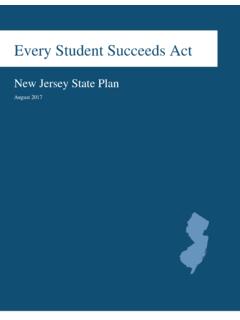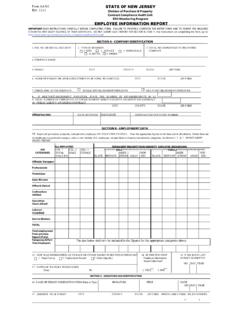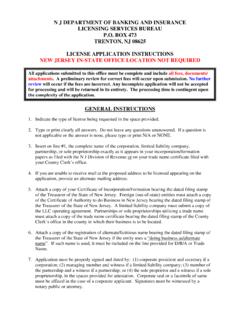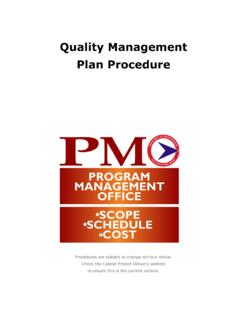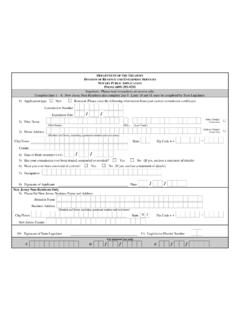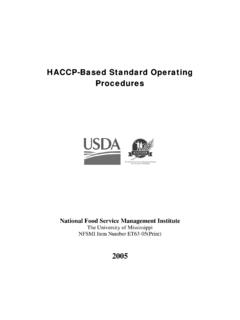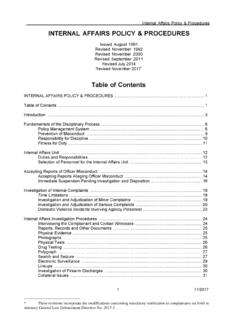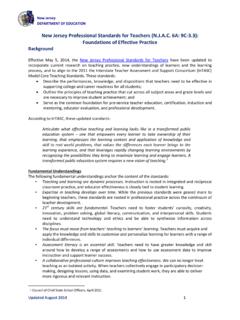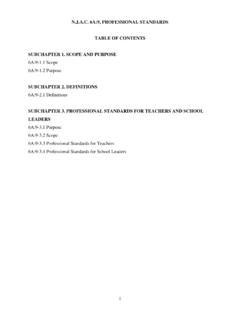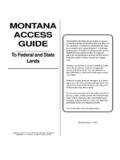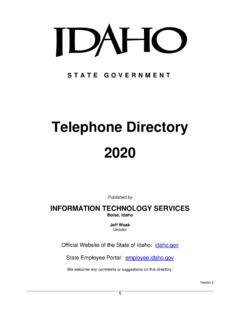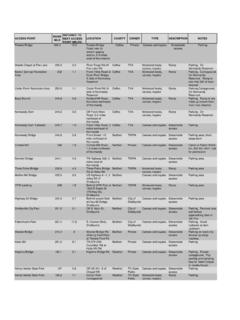Transcription of Tax Topic Bulletin GIT-5 Exempt Obligations - New Jersey
1 Rev. 03/19 Tax Topic Bulletin GIT-5 Exempt Obligations Introduction In general, interest and dividends are taxable and must be included in income on your New Jersey Income Tax return. However, New Jersey law exempts certain income from tax including: Interest and gains from Obligations of the State of New Jersey or any of its political subdivisions; Interest and gains from direct Obligations of the federal government, such as Savings Bonds; Certain distributions from New Jersey Qualified Investment Funds; Distributions attributable to interest earned on federal Obligations paid by mutual funds, regardless of whether or not the mutual fund holding the Obligations is a qualified investment fund; Earnings on qualified distributions from qualified State tuition program accounts, including NJBEST accounts; and Earnings on qualified distributions from qualified State 529A ABLE accounts.
2 This Bulletin explains how to report taxable and tax- Exempt interest income on your New Jersey Income Tax return and provides a list of Obligations that are Exempt from New Jersey Income Tax. This document is designed to provide guidance to taxpayers and is accurate as of the date issued. Subsequent changes in tax law or its interpretation may affect the accuracy of this publication. General Information Exempt Obligations Interest and gains received from Obligations of the State of New Jersey or any of its political subdivisions are not includable in income (subject to tax) on your New Jersey Income Tax return (Form NJ-1040 or Form NJ-1040NR). This exemption includes interest and gains on Obligations , such as bonds, issued by counties, municipalities, school or other districts, and New Jersey agencies and authorities.
3 Also, interest and gains from certain federal Obligations are Exempt from State or local taxation by State or federal law. Reporting Tax- Exempt Interest If you file a New Jersey Resident Income Tax return (Form NJ-1040), you must show the amount of Exempt interest earned on Line 16b, Form NJ-1040. If the amount of Exempt interest you report is more than $10,000, you must include an itemized schedule, by source. This does not change your tax- Exempt interest to taxable interest. Taxable interest is reported separately on Line 16a, Form NJ-1040. The nonresident return (Form NJ-1040NR) does not have a separate line for reporting Exempt interest. NOTE: Do not include Exempt interest on the taxable interest income line on your return, since tax- Exempt interest is not part of New Jersey income.
4 Exempt Obligations 2 Rev. 03/1 9 Taxable Obligations Interest and gains from Obligations of states and their political subdivisions (other than New Jersey and its political subdivisions) are fully taxable for New Jersey Income Tax purposes, even though such interest and gains may be Exempt for federal income tax purposes. All taxable interest income must be reported on your New Jersey Income Tax return at Line 16a, Form NJ-1040 or Line 16, Column A, Form NJ-1040NR. Likewise, gains from the sale of Obligations whose interest is taxable must be taken into account when calculating your net gain from the disposition of property. See Gain or Loss From Sale below. Gain or Loss From Sale In determining net gains or income from the disposition of property for New Jersey Income Tax purposes ( , capital gains), do not include income or gains from Obligations whose interest is Exempt from New Jersey tax.
5 Likewise, losses from sales of Exempt Obligations may not be deducted when calculating net gains (or losses) on Schedule NJ-DOP, Form NJ-1040 (or Part I, Form NJ-1040NR). Qualified Investment Funds Distributions and gains from a New Jersey qualified investment fund are excludable from income to the extent that the distributions and gains come from the qualified Exempt Obligations held by the fund. To be a qualified investment fund the fund must: Be a regulated investment company; Have 80% or more of its investments (other than cash or receivables) in Obligations that are Exempt from New Jersey Income Tax; and Complete and retain Form IF-1, Certification of Qualified Investment Fund, to document its status. This certification does not need to be filed with the Division but must be made available upon request.
6 A fund may hold up to 20% of its investments in Obligations that are not tax- Exempt . The portion of the fund s distributions and gains that comes from those taxable investments must be reported as dividends and/or capital gains (as indicated on your Form 1099) on your New Jersey Income Tax return (Line 17 and/or Line 2, Schedule NJ-DOP, Form NJ 1040 or Lines 17 and/or 19, Column A, Form NJ-1040NR). A fund that is a qualified investment fund for New Jersey purposes is required to notify its shareholders by February 15 of the portion of their distribution that may be excluded from income. You should contact your broker to determine if yours is a qualified investment fund for New Jersey Income Tax purposes. Mutual Funds The distributions received by shareholders of regulated investment companies, commonly referred to as mutual funds, are subject to New Jersey Income Tax as dividends and/or capital gains, unless the fund is a Exempt Obligations 3 Rev.
7 03/1 9 qualified investment fund for New Jersey purposes (see Qualified Investment Funds). However, the distributions that are attributable to interest earned on federal Obligations are excludable whether or not such Obligations are held by a qualified investment fund. Taxable distributions should be included on Line 17 and/or Line 2, Schedule NJ-DOP, Form NJ-1040 or Lines 17 and/or 19, Column A, Form NJ-1040NR. The tax- Exempt portion of any distribution is reported on Line 16b, Form NJ-1040. The nonresident return does not have a line for reporting the tax- Exempt portion. Unit Investment Trusts A unit investment trust is a fund with a fixed number of units available for sale to investors and that terminates after a specific period of time. Interest received by a shareholder in a unit investment trust is Exempt from New Jersey Income Tax, provided the investments of the trust consist of Exempt Obligations .
8 State Tuition Program Accounts Earnings on qualified distributions from qualified State tuition program accounts, including the New Jersey Better Educational Savings Trust (NJBEST) accounts, are Exempt from New Jersey Income Tax. If you file a New Jersey Resident Income Tax return, you must show the amount of tax- Exempt interest earned on Line 16b, Form NJ 1040. The nonresident return does not have a line for reporting Exempt interest. Earnings on nonqualified distributions from qualified State tuition program accounts, including NJBEST accounts, however, are taxable. Taxable interest is reported on Line 16a, Form NJ-1040 or Line 16, Column A, Form NJ-1040NR. Taxable dividends and/or capital gains (as indicated on Form 1099) must be reported on Line 17 and/or Line 2, Schedule NJ-DOP, Form NJ-1040 or Lines 17 and/or 19, Column A, Form NJ-1040NR.
9 State 529A ABLE Accounts Earnings on qualified distributions from qualified State 529A Achieving a Better Life Experience program (ABLE) accounts, are Exempt from New Jersey Income Tax. If you file a New Jersey Resident Income Tax return, you must show the amount of tax- Exempt interest earned on Line 16b, Form NJ-1040. The nonresident return does not have a line for reporting Exempt interest. Earnings on nonqualified distributions from qualified State 529A ABLE accounts, however, are taxable. Taxable interest is reported on Line 16a, Form NJ-1040 or Line 16, Column A, Form NJ-1040NR. Taxable dividends and/or capital gains (as indicated on Form 1099) must be reported on Line 17 and/or Line 2, Schedule NJ-DOP, Form NJ-1040 or Lines 17 and/or 19, Column A, Form NJ-1040NR. Nonresidents When completing the New Jersey Nonresident Income Tax return (Form NJ-1040NR), complete Column A as if you were a resident of New Jersey .
10 Report interest and dividends in Column A only if they would have been taxable to a New Jersey resident. When completing Column B, however, do not report any interest or dividends unless they were earned as part of a business activity in New Jersey . Exempt Obligations 4 Rev. 03/1 9 Personal interest and dividends (even if from a New Jersey bank or broker) should not appear in Column B. If you have an entry in Column A of the NJ-1040NR that represents personal interest or dividends, report 0 on the corresponding line in Column B. Taxability of Federal and New Jersey Obligations A partial list of various federal and New Jersey securities follows, together with an indication of whether the interest and gain from each are taxable (T) or Exempt (E). Remember, do not include interest income or gain from the sale of Exempt Obligations in your New Jersey taxable income.
